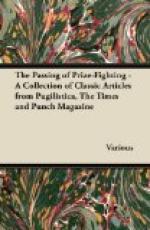Then there was CHEPSTOWE, the poet. I am old enough to remember him; and it pleases me sometimes to call back to my mind this paltry and forgotten little literary Bombastes. As I write, I have before me some of the reviews that greeted his boisterous invasion of the regions of song. “Mr. CHEPSTOWE,” said one, “has struck a note which is destined to vibrate so long as the English language is spoken in civilised lands. He is no ordinary rhymester, struggling feebly in the bonds of convention. With a bold and masterful on-rush, he cleaves his way unhesitatingly to the very heart of things, tears it out, and lays it, palpitating and bleeding, before the eyes of humanity. We have only space for a few lines from the magnificent Ode to Actuality:—
“’Prone in the caverns
of the vasty deep
I lay,
And slept not, though I seemed to sleep.
The day
Pierced not with sullen eyes of pallid scorn
The dark,
Unplumbed abyss, where, girt with red limbs torn.
The shark
Sported, and eyeless monsters crawled in slime—’
“No extract can, however, convey an adequate idea of this grand poem, on which, as on the bed rock, Mr. CHEPSTOWE’s fame is established for ever, SHAKSPEARE himself might have been proud to have written it.” I may remark, parenthetically, that in his “Ode” CHEPSTOWE pictured himself as a sort of animate skeleton:—
“Sockets where light once shone
grinned emptiness;
The teeth
Were fallen from the gaping, gumless jaws; nathless
Beneath
The cold smooth skull, the brain retained her throne.”
Amid these uncomfortable surroundings CHEPSTOWE described himself as penetrated with raptures of fierce joy at having shaken himself free from the world and its puling insincerities to dwell amid “Unpitying shapes of death’s dread twin despair,” where “Rapine and slaughter raged, and none rebuked.” Another reviewer observed that “The soul of ARCHER’s, the tavern-brawler’s glorious victim, KIT MARLOWE, has taken again a habitation of clay. She speaks trumpet-tongued by the mouth of Mr. CHEPSTOWE. We note in these outpourings of dramatic passion an audacity, an energy, an enthusiasm, that are calculated to shake Peckham Rye to its centre, and make Balham tremble in its ridiculous carpet slippers. Who—to take only one example—but Mr. CHEPSTOWE or MARLOWE could have written thus of ’Rapture’?—
“’Not in the mouths of prating
men who deem
That God dwells in the senseless clay
they mould,
Who live their little lives and die their
deaths,
Lapped in a smug respectability;
Who never dreamt of breaking puny laws
Formed for a puny race of grovellers;
But in the blood-stained track of flaming
swords,
Wielded by knotty arms in Man’s
despite,
Or on the wings of crashing battle-balls,
Bone-shattering dealers of a thousand
wounds,
The roaring heralds of indignant God,
There rapture dwells, and there I too
would dwell.’




